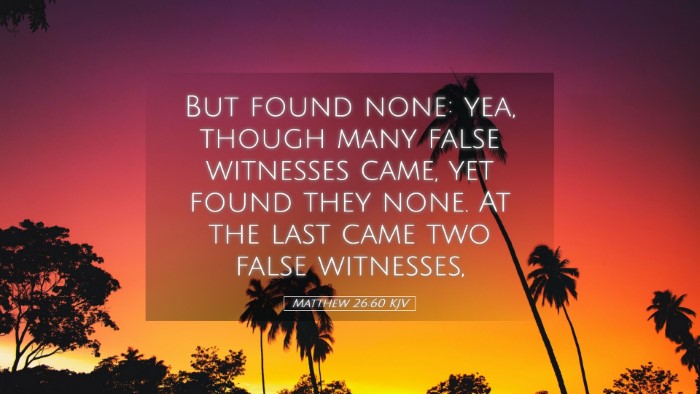Commentary on Matthew 26:60
Matthew 26:60 states: "But found none, though many false witnesses came. Yet found they none. At the last came two false witnesses."
Introduction
This verse occurs during the trial of Jesus, a pivotal moment in the New Testament narrative. The gathering of false witnesses, as recorded in the lead-up to His crucifixion, highlights both the legal and moral corruption surrounding the accusations against Him. Understanding this verse through various commentaries reveals profound insights relevant to pastoral care, academic study, and personal reflection.
Analysis of the Text
In analyzing Matthew 26:60, we will draw insights from Matthew Henry, Albert Barnes, and Adam Clarke.
Contextual Background
Before delving into individual commentaries, it is essential to provide context. The trial of Jesus before the Sanhedrin was marked by haste and illegality. Jewish law required corroborating evidence for accusations, yet this verse underlines the failure of the court to produce reliable testimony.
Matthew Henry's Commentary
Matthew Henry emphasizes the severity of false witness. He notes that numerous witnesses came forward, but their testimonies were unsubstantiated. Henry states:
"Though many false witnesses came, yet found they none that could agree together in accusing him. This illustrates the truthfulness of Christ, that in a matter so grievous, and in which so many had a mind to charge him, there should be no agreement."
This observation speaks to the integrity of Jesus even in the face of falsehood. Henry's perspective elucidates that the failure of the witnesses reflects not only their malice but also the inherent righteousness of Jesus.
Albert Barnes' Commentary
Albert Barnes provides a detailed explanation of the legal aspects surrounding this event. He points out that the law required at least two witnesses to establish a charge:
"In the mouth of two or three witnesses shall every word be established." (Matthew 18:16)
Barnes argues that the Sanhedrin's search for testimony was desperate and highlights their unethical behavior in relying on false witnesses:
"They brought in many false witnesses; they were determined to condemn Him at any cost, seeking witnesses against Him in a way that was fundamentally improper."
Through Barnes' lens, we see a substantial critique of the judicial processes in place and their manipulation for unrighteous ends.
Adam Clarke's Commentary
Adam Clarke emphasizes the prophetic aspect of this trial, suggesting that it fulfilled Old Testament scripture. Clarke notes:
"The absence of true witnesses and the presence of false ones fulfill the prophecies regarding the suffering servant."
His commentary focuses on the theological implications of this event, where the injustice faced by Jesus is interpreted as part of His redemptive work. Clarke’s exploration reminds scholars and theologians of the significance of Christ's sufferings as foreordained, refreshing their understanding of His role as the innocent Lamb.
Theological Reflections
This verse provokes significant theological reflection on various themes:
- The Justice and Injustice of Earthly Courts: The corrupt practices observed in the trial show a stark contrast to divine justice.
- The Integrity of Christ: Jesus is portrayed as unblemished amidst the lies, emphasizing His role as the perfect sacrifice.
- The Role of False Witness: In a broader context, this serves as a warning against the spread of misinformation and the destructive power of lies.
- Fulfillment of Prophecy: Clarke’s note on prophecy invites believers to consider how God orchestrates events for His ultimate plan.
Practical Applications for Pastors and Theologians
This passage is rich with practical implications:
- Encouragement in Suffering: Just as Jesus faced unjust trials, believers are reminded to endure suffering with patience and faith.
- Moral Integrity: Pastors are called to maintain integrity and truth in their ministry, reflecting the character of Christ.
- Church Discipline: The necessity of true testimony within the church calls for careful consideration of accusations and discipline.
- Understanding Redemption: The events surrounding Jesus’ trial provide a fuller understanding of the suffering servant and the nature of redemption.
Conclusion
Matthew 26:60 serves not merely as a historical account but as a profound theological reflection on the nature of truth, justice, and the fulfillment of divine prophecy in the person of Christ. The insights gleaned from public domain commentaries underscore the importance of integrity, the weight of falsehood, and the redemptive purpose behind suffering. For pastors, scholars, and students of theology, this verse is a reminder of the stark contrasts present in the Christian narrative and an invitation to deeper contemplation on the justice of God amid human wrongdoing.


